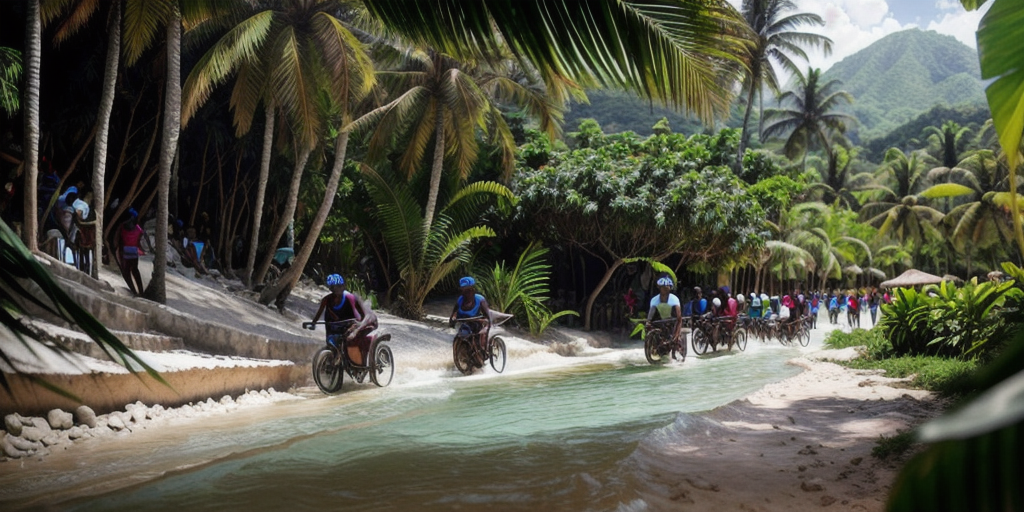
State Department Updates ‘Level 4’ Travel Advisory For Haiti – What To Know
How did your country report this? Share your view in the comments.
Diverging Reports Breakdown
State Department Updates ‘Level 4’ Travel Advisory For Haiti – What To Know
On July 15, the United States government updated its Level 4 “Do Not Travel” advisory for Haiti to include the risk of potential terrorism. Particularly in Haiti’s capital Port-au-Prince, organized and violent crime is reportedly “rampant,” in addition to there being an expansion of “terrorist activity.” The State Department also includes risk indicators for kidnapping, crime, civil unrest, and limited health/emergency care.
The State Department reissued its Haiti travel advisory “after [the] addition of [a] terrorism indicator.” Particularly in Haiti’s capital Port-au-Prince, organized and violent crime is reportedly “rampant,” in addition to there being an expansion of “terrorist activity.”
“There is risk of terrorist violence, including attacks and other violent gang activity in Haiti. There are gangs that are designated as terrorist organizations present in Haiti,” emphasized the U.S. authority.
What Else Should Travelers Know About The Haiti Travel Advisory?
Located in the Caribbean, Haiti shares the island of Hispaniola with its neighbor, the Dominican Republic.
The State Department’s “Do Not Travel” advisory for Haiti also includes risk indicators for kidnapping, crime, civil unrest, and limited health/emergency care. Additionally, travelers should be aware that Haitian authorities have declared the country under a state of emergency since March 2024. Port-au-Prince International Airport (also known as Toussaint Louverture International Airport) has been considered a danger zone, and the Federal Aviation Administration (FAA) currently bans U.S. airlines from flying there.
“Exchanges of gunfire with criminal gangs, organized crime, and terrorists have occurred in the neighborhood just outside the Port-au-Prince International Airport,” says the State Department. “Travelers are sometimes followed and violently attacked and robbed shortly after leaving the airport, or while entering or leaving hotels in Port-au-Prince.”
If travelers do end up on a trip to Haiti, the State Department advises that they avoid “protests, demonstrations, and roadblocks.” According to the source, those types of crowds “are common and unpredictable,” often resulting in damage or violence. Moreover, instances of mob killings and public assaults are reportedly increasing.
Travelers are strongly advised not to cross the land border between the Dominican Republic and Haiti due to safety risks.
“Do not travel to Haiti for any reason,” the State Department warns.
Travel warning: Feds issue Level 4 advisory against travel to Caribbean destination due to crime, terrorism
Haiti has been under a “Level 4: Do Not Travel’ advisory since March 2024. The new update issued on Tuesday, July 15, highlights a heightened threat. U.S. citizens continue to be targets of kidnapping, with reports of victims being harmed or killed. Mob killings and public assaults are also on the rise, and people are targeting those they think have committed crimes.. Clinics and hospitals in Haiti often require payment in cash before treatment.
The United States Department of State (DOS) updated its travel advisory for Haiti to specifically warn of terrorist activities in addition to the existing dangers.
The country has been under a “Level 4: Do Not Travel” advisory since March 2024, primarily due to widespread civil unrest, criminal activity and riots.
The new update issued on Tuesday, July 15, highlights a heightened threat.
“There is risk of terrorist violence, including attacks and other violent gang activity in Haiti,” the DOS warns. “There are gangs that are designated as terrorist organizations present in Haiti.”
Beyond the new terrorism concerns, several risks persist for U.S. citizens in Haiti.
This includes kidnapping. U.S. citizens continue to be targets of kidnapping, with reports of victims being harmed or killed. Families have also paid tens of thousands of dollars in ransom for their loved ones.
Other concerns are demonstrations and roadblocks, which often damage or destroy infrastructure and can become violent, the DOS states. Mob killings and public assaults are also on the rise, and people are targeting those they think have committed crimes.
Travelers should also not cross by land between Haiti and the Dominican Republic, due to a risk of kidnapping and violence.
“These dangers are present on roads from major Haitian cities to the border,” according to the statement. “The U.S. Embassy cannot help you enter the Dominican Republic by air, land or sea. U.S. citizens who cross into the Dominican Republic at an unofficial crossing may face high immigration fines when they try to leave.”
The U.S. Coast Guard also has concerns about security in Haiti’s ports. Until those issues are addressed, the guard advises mariners and passengers traveling through Haitian ports to exercise caution.
The DOS also said that there is little the U.S. government can do to help its citizens in Haiti due to a general lack of resources, including shortages in gasoline, electricity, medicine and medical supplies. Clinics and hospitals in Haiti often require payment in cash before treatment.
Those who choose to travel to Haiti should take the following precautions:
Source: https://travelnoire.com/haiti-travel-advisory-state-department-update-level-4
